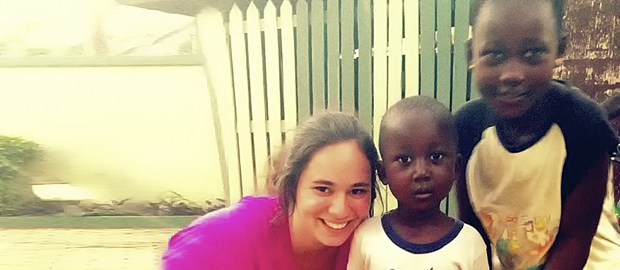Experience makes all the difference for HSSP majors
Health: Science, Society and Policy sends students to the front lines of health care and the halls of government to help people around the world
 Photo/ Clint Hall
Photo/ Clint HallJennie Bromberg ’15 in Ghana
In New York City’s busiest emergency room, can one undergraduate intern make a difference?
Danny Novak ’15, a Health: Science, Society and Policy (HSSP) major, spent his summer interning at New York’s Bellevue Hospital as part of his experiential learning requirement. Novak joined the Project Healthcare summer intensive program where he assisted medics on ambulance runs, observed surgeries and autopsies, and conducted clinical research. But it was his rotations in the ER that changed his life.
There, amid the bustle and chaos of a sprawling urban hospital, he met a young Russian struggling to communicate with doctors and nurses who spoke only English. Novak, a fluent Russian speaker, stepped in and helped the man navigate his admission and treatment.
“I was able to explain to him what was happening, comfort him and make him feel better,” Novak recalls. “I was able to do these little things that make all the difference. I always knew I wanted to be a doctor and go into the field of emergency medicine, and this experience solidified that.”
The HSSP major requires hands-on learning through internships, pre-approved summer programs or research projects. Since its launch in 2003, the interdisciplinary major has become one of Brandeis’ most popular, growing from six students in 2003-2004 to 91 in 2013-2014. HSSP majors travel the world, working on the front lines of health care from Bellevue to a clinic in Mumbai, from congress to The Hague.
“What sets HSSP apart from other experiential learning programs is the unique mix of student experiences,” says Darren Zinner, associate director of the program. “Some students conduct medical research in a lab, some work in hospitals and some in congress. HSSP allows students to see the many different faces of the diamond that is health care.”
So, while Novak interned at Bellevue Hospital, his classmate Jennie Bromberg ’15 spent the summer working for a nonprofit in Africa.
In Ghana, Bromberg interned with Unite for Sight, an organization that brings eye care to communities in Ghana, India, and Honduras. Every day, she traveled for hours on dusty, unpaved roads to reach remote villages, sitting among bags of glasses and eye drops. She helped optometrists set up temporary clinics, perform eye exams and dispense medications.
Working in Ghana taught Bromberg to treat the person, not the disease — to take into account culture, background, even religion when prescribing medication. For instance, Bromberg changed her instructions when handing out out eye-drops during Ramadan, the Muslim holy month, to accommodate the community’s strict religious code.
“I never would have even thought about that in a classroom,” she says.
Another thing she couldn’t experience in class: the person’s smile when she puts on glasses and sees clearly for the first time in years.
“That was a truly rewarding experience,” Bromberg says.
Categories: General, Humanities and Social Sciences, Student Life





